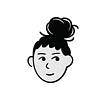Take a photo of a barcode or cover
Charmingly wonderful. I can see why it draws comparisons to The Perks of Being a Wallflower—Augustus reminded me a lot of Patrick as played by Ezra Miller—but as a book, this was better in many ways. It's a quick and entertaining read with young love at its heart. You'd have to be cold-blooded not to root for them. I'm still laughing about Hazel's suggested headline for the classified ad to give away her childhood swing set: "Lonely, Vaguely Pedophilic Swing Set Seeks the Butts of Children."
The movie version (of course) comes out in June so read it now before they (probably) ruin it.
The movie version (of course) comes out in June so read it now before they (probably) ruin it.
Now that The Fault in Our Stars has been released for about a year, I was actually number 1 in the queue for the first available copy of 56 books in my library system. And now, having read it, I understand why it took so long for me to get my hands on it.
The self-aware young cancer patients kind of ripped my heart out with their gallows humor, reflections on the legacy you leave behind after death, and existential questions. Maybe I was reading it too soon after the death of a family member and my own emotions were unusually involved but I found this to be a perfect bitter life-affirming and heart-breaking novel. At the end I was crying and laughing as one does when someone dies and the world continues to exist in all its absurdity and wonder.
The self-aware young cancer patients kind of ripped my heart out with their gallows humor, reflections on the legacy you leave behind after death, and existential questions. Maybe I was reading it too soon after the death of a family member and my own emotions were unusually involved but I found this to be a perfect bitter life-affirming and heart-breaking novel. At the end I was crying and laughing as one does when someone dies and the world continues to exist in all its absurdity and wonder.
emotional
funny
sad
medium-paced
Plot or Character Driven:
Character
Strong character development:
N/A
Loveable characters:
Yes
Diverse cast of characters:
Yes
Flaws of characters a main focus:
Complicated
Don't get me wrong, I love John Green's books, but this one felt a little underwhelming.
This entire book felt a little stereotypical and almost boring (except for the first and last few chapters). I mean, yes, it did obviously make me cry, but throughout the entire book, we knew it was coming.
I'm giving it 4 starts because it was still beautifully written, but I don't think I would read it again.
This entire book felt a little stereotypical and almost boring (except for the first and last few chapters). I mean, yes, it did obviously make me cry, but throughout the entire book, we knew it was coming.
I'm giving it 4 starts because it was still beautifully written, but I don't think I would read it again.
So, I am a big fan of Benedict Cumberbatch, and he did this Indy film called "Third Star." I knew this film made people cry, and almost didn't watch it... but knowing the calibre of Mr. Cumberbatch's acting I gave in and watched the movie. Well, as expected--I cried. However, I also had a feeling of catharsis and hope, had enjoyed a film about relationships that far exceeded the sadness within it, and greatly enjoyed the experience--despite the sadness.
The problem is how to explain this when you want to recommend this film to a friend?!? Yikes!
Then I read "The Fault in Our Stars" (which I didn't know ahead of time was going to be really sad, unlike "Third Star".) And I run in to EXACTLY the same problem. Exquisite writing. A wonderful, touching, story that I could empathize with and enjoy--yet it is extremely sad in many places. I cried. Repeatedly.
Also, I worked for a large portion of my adult field in the medical field. It has always annoyed me when people write or portray disease inaccurately. I was very pleased with how careful John Green was to portray the people in this book as real human beings who were dealing with *real illness* rather than as some kind of fake-symbols-of-shining-goodness like they are often portrayed. I think it is very unfair to people who ARE ill to give them these unrealistic "examples".
I loved the sentiment, that is stated again and again in the book, that people with disease do NOT just exist for well people to learn lessons-- they exist because they are people-- who are living a life. And they are doing the best they can with what they've got. (Or maybe they aren't... but that is their choice, and their life.)
So, I don't know how to recommend a really well written, but good, sad book other than to say-- this is a REALLY good book.
Also, if you are the type of person who often reads books and knows that there are metaphors and stuff like that and you wish you knew what they were and feel like you missed out on what they were... John Green actually has a FAQ where he answers what some his intended symbolism is, and he also has some writers who have found some cool metaphors he may or may not have intended (which Mr. Green has said he feels is just as valid because "BBTTR- Books Belong To Their Readers") and many other questions. (Don't go there if you haven't read the book yet though, HUGE spoilers for almost the whole book are there.)
It is here: http://johngreenbooks.com/questions-about-the-fault-in-our-stars-spoilers/
I love that he did this and wish more authors did.
Hope you enjoy it. I did. Definitely a book I'll be re-reading.
The problem is how to explain this when you want to recommend this film to a friend?!? Yikes!
Then I read "The Fault in Our Stars" (which I didn't know ahead of time was going to be really sad, unlike "Third Star".) And I run in to EXACTLY the same problem. Exquisite writing. A wonderful, touching, story that I could empathize with and enjoy--yet it is extremely sad in many places. I cried. Repeatedly.
Also, I worked for a large portion of my adult field in the medical field. It has always annoyed me when people write or portray disease inaccurately. I was very pleased with how careful John Green was to portray the people in this book as real human beings who were dealing with *real illness* rather than as some kind of fake-symbols-of-shining-goodness like they are often portrayed. I think it is very unfair to people who ARE ill to give them these unrealistic "examples".
I loved the sentiment, that is stated again and again in the book, that people with disease do NOT just exist for well people to learn lessons-- they exist because they are people-- who are living a life. And they are doing the best they can with what they've got. (Or maybe they aren't... but that is their choice, and their life.)
So, I don't know how to recommend a really well written, but good, sad book other than to say-- this is a REALLY good book.
Also, if you are the type of person who often reads books and knows that there are metaphors and stuff like that and you wish you knew what they were and feel like you missed out on what they were... John Green actually has a FAQ where he answers what some his intended symbolism is, and he also has some writers who have found some cool metaphors he may or may not have intended (which Mr. Green has said he feels is just as valid because "BBTTR- Books Belong To Their Readers") and many other questions. (Don't go there if you haven't read the book yet though, HUGE spoilers for almost the whole book are there.)
It is here: http://johngreenbooks.com/questions-about-the-fault-in-our-stars-spoilers/
I love that he did this and wish more authors did.
Hope you enjoy it. I did. Definitely a book I'll be re-reading.
I didnt want to read this book because I knew that it would be heartbreaking and sad at some point, but I'm glad I did. It was truly touching and eye opening. Hazel and Augustus' story is a beautiful one.
I don't think I've ever sobbed out loud at a book before, but this one took me there. But I also laughed aloud, many times. An author honestly addresses the oblivion we all face, with humor and grace. Hazel Grace. I just finished it and I'm kind of speechless. It just couldn't be any better than this.
challenging
funny
hopeful
sad
I mentioned to a friend yesterday that I'd finally gotten around to reading this novel. She asked me if I read a lot of young adult fiction, and I admitted, outside of [a:John Green|1406384|John Green|https://images.gr-assets.com/authors/1353452301p2/1406384.jpg], I don't. But I have read quite a bit of John Green. Back when I was teaching high school, I discovered his Crash Course Literature videos. I loved these and used them whenever they had one relevant to the topic at hand. Not many people are really good at talking about literature. And the style of them worked well for high school students. Most of my students had read some of Green's works, so I decided to give [b:Turtles All the Way Down|35504431|Turtles All the Way Down|John Green|https://i.gr-assets.com/images/S/compressed.photo.goodreads.com/books/1503002776l/35504431._SY75_.jpg|21576687] a try. It did not disappoint. At about this same time, [b:The Anthropocene Reviewed|55145261|The Anthropocene Reviewed|John Green|https://i.gr-assets.com/images/S/compressed.photo.goodreads.com/books/1616514130l/55145261._SY75_.jpg|85964970] came out, so I decided to try some of Green's non-fiction, which is just as good as his fiction. Since then, I've read several other works of his, but I'd been putting this one off, for whatever reason.
I can't go into it without risking spoiling things, but I think it's quite a good novel. The characters are memorable. Their situations are uncommon. They are believable. They grapple with the existential dimensions of life, because the events of their lives warrant it. And it is Green's natural and authentic way of exploring philosophical themes in their real-world context that I like most about him. But, as I've said, I don't want to say much too much about it. If you like his work, you'll like this. If you've never read him, I've found all of his work to be solid, and this would be a good place to start.
Green is a good follow on all the socials, if you're into that.
I can't go into it without risking spoiling things, but I think it's quite a good novel. The characters are memorable. Their situations are uncommon. They are believable. They grapple with the existential dimensions of life, because the events of their lives warrant it. And it is Green's natural and authentic way of exploring philosophical themes in their real-world context that I like most about him. But, as I've said, I don't want to say much too much about it. If you like his work, you'll like this. If you've never read him, I've found all of his work to be solid, and this would be a good place to start.
Green is a good follow on all the socials, if you're into that.



